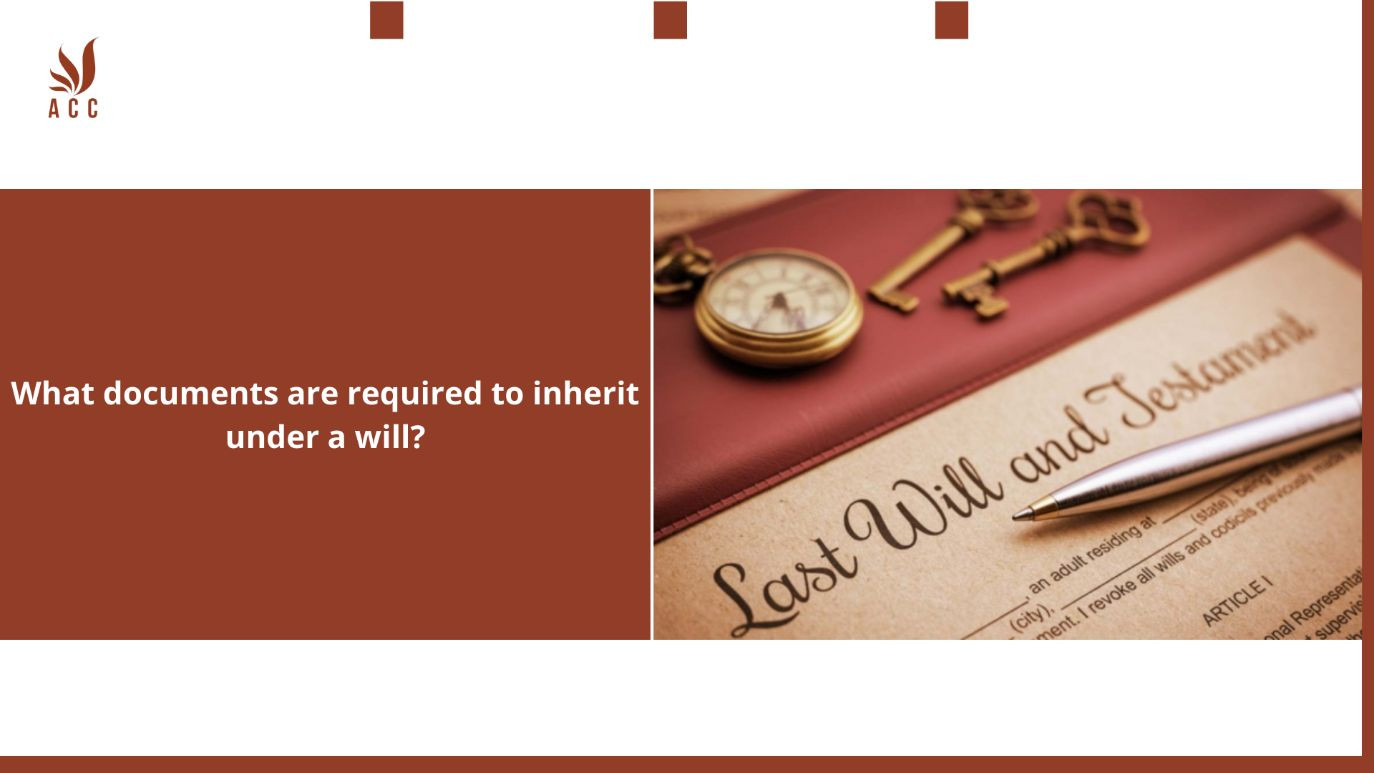Inheriting under a will involves certain legal and administrative processes that require specific documents to ensure the orderly transfer of assets and property from the deceased person (the testator) to the designated beneficiaries. The exact documents required may vary depending on the jurisdiction and local laws, but here are the key documents typically involved in the inheritance process:

1. Last Will and Testament:
The primary document that outlines the testator's wishes regarding the distribution of their assets and property among beneficiaries is the last will and testament. This document specifies who the beneficiaries are, what they are entitled to inherit, and any conditions or instructions associated with the inheritance.
2. Death Certificate:
A copy of the deceased person's death certificate is essential for initiating the inheritance process. This document provides legal proof of the testator's death.
3. Probate Documents (if required):
In many jurisdictions, wills, especially those involving substantial assets, must go through a legal process called probate. Probate documents may include:
4. Petition for probate:
A formal request to the court to recognize the will and appoint an executor.
Letters testamentary: Official documents issued by the court that grant authority to the executor to administer the estate.
Asset Inventory: An inventory of the deceased person's assets and liabilities, including real estate, bank accounts, investments, personal possessions, debts, and outstanding obligations. This helps in determining the total value of the estate.
5. Executor's Appointment:
If the will names an executor (a person responsible for managing the estate and executing the will's instructions), documentation confirming their appointment by the court or as per the terms of the will is necessary.
6. Bank Statements and Financial Documents:
Bank statements, investment account statements, and financial documents are required to determine the status of the deceased person's accounts and assets.
7. Property Deeds (for Real Estate):
Deeds and titles for any real estate owned by the deceased person are crucial for transferring ownership to the beneficiaries.
8. Life Insurance Policies and Beneficiary Designations:
Copies of life insurance policies and beneficiary designation forms should be provided to ensure that life insurance proceeds are distributed correctly.
9. When using ACC Law Firm's testament, entrepreneurs will receive
10. Q&a
Q: What documents are typically required to inherit under a will?
A: To inherit under a will, the key documents that may be required include:
The Will: The original, legally valid will that outlines the deceased person's wishes regarding the distribution of their assets.
Death Certificate: A copy of the deceased person's death certificate to confirm their passing.
Proof of Beneficiary Status: Documentation proving your status as a named beneficiary in the will.
Q: Do beneficiaries need to provide additional documentation when inheriting assets?
A: Yes, depending on the complexity of the estate and the specific assets involved, beneficiaries may need to provide additional documentation, which can vary but might include:
Identification: Government-issued photo identification, such as a driver's license or passport.
Social Security Number: In some cases, beneficiaries may need to provide their Social Security number for tax purposes.
Bank Account Information: If the inheritance includes funds, you may need to provide bank account information for direct deposits.
Q: What role does the executor of the will play in document verification?
A: The executor of the will, who is responsible for overseeing the distribution of assets, plays a critical role in verifying the documents provided by beneficiaries. The executor ensures that the required documents are in order, assists with any legal processes, and facilitates the transfer of assets to the rightful beneficiaries in accordance with the terms of the will.
Q: Are there variations in document requirements based on the type of assets being inherited?
A: Yes, the specific documents required can vary based on the type of assets being inherited. For instance:
Real Estate: Inheriting real estate may involve additional documentation, such as property deeds, titles, and records of ownership.
Financial Accounts: Inheriting financial accounts like bank accounts or investments may require providing account numbers and statements.
Personal Property: Inheriting personal belongings may involve less formal documentation, but the executor may facilitate the transfer based on the will's instructions.
Nội dung bài viết:






Bình luận